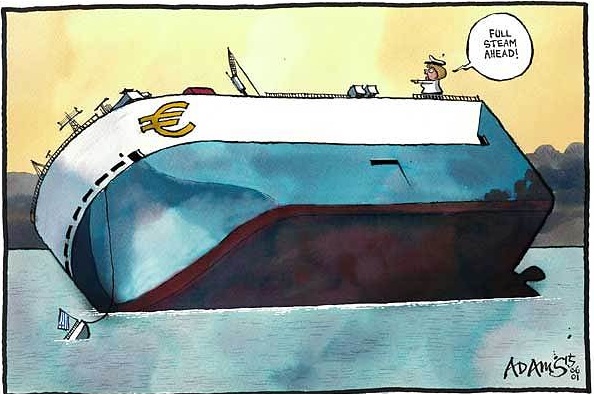- Greece will not accept cuts to pension payments or public sector wages, saying two-thirds of pensioners are either below or near the poverty line
- International creditors want pension spending cut by 1% of GDP – it accounts for 16% of Greek GDP. They say they want to target early retirement, not lower-income pensioners
- EU officials say Greece has agreed to budget surplus targets of 1% of GDP this year, followed by 2% in 2016 and 3.5% by 2018; Greece says nothing is agreed until everything is agreed
- Creditors also want a wider VAT base; Greece says it will not allow extra VAT on medicines or electricity bills
- Greece complains creditors focus on increasing taxes instead of cracking down on tax evasion; IMF is concerned Athens is not offering credible reforms
The other side:
- Germany’s Wolfgang Schaeuble said there were “no substantial proposals” from Greece. Arriving for the summit, he told reporters he had not seen anything new from Greece so far and “without anything new, there is nothing for the ministers to prepare for their leaders”
- The head of the group of eurozone finance ministers, Jeroen Dijsselbloem of the Netherlands, said it would be “impossible to have a final assessment” as the Greek proposals were very recent, but they would “hopefully [form] the basis for final talks”
- Finland’s Alexander Stubb said he did not see a deal being reached on Monday: “We have wasted a lot of air miles, both on the finance ministers’ side and on the prime ministers’ side.
- Irish Finance Minister Michael Noonan said that there had been confusion with several versions of new Greek proposals being discussed. He said it was not clear that there had been enough movement from Greece and that he believed there might have to be another meeting on Thursday
The Greek government has sent its new proposal to the European Commission, the European Central Bank (ECB) and the International Monetary Fund (IMF).
Progress is being made towards solving Greece’s debt crisis, France’s Finance Minister Michel Sapin said on Monday, while noting that a solution without the International Monetary Fund (IMF) was not currently possible.
“Reaching an agreement requires that each side evolves. If each side stays in its position, an agreement is not possible,” Michel Sapin told Radio France Internationale. “It is this evolution which is taking place, and I believe that work is taking place and in good conditions.”
Luxembourg’s Foreign Minister Jean Asselborn said on German radio he expected that the leaders of euro zone countries would make progress toward solving the Greek crisis at an emergency summit on Monday. “There will be a lurch forward,” Jean Asselborn told Germany’s Deutschlandfunk radio.
The Greek government’s aim is to close the gap between Athens and creditors in order to secure a deal. Issues such as the abolition of reduced value added tax that applies to islands of the Aegean, putting a stop to early retirement starting in 2015 and cuts on high pensions are no longer “taboo” issues. In exchange for these concessions, Tsipras wants a clear and concrete commitment from creditors for Greece’s debt restructuring.
However, the abolition of reduced VAT in islands is a subject that created turmoil in the coalition government with junior partner ANEL leader and Defense Minister Panos Kammenos saying that he and his party lawmakers will vote against such measure.
Cabinet members said there is still a possibility of a rift with Greece’s European partners, without excluding the possibility of a bailout program extension for a few months, if an agreement is not achieved.
In Brussels a crucial emeergency meeting ended on a hopeful note.

